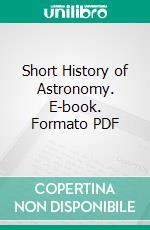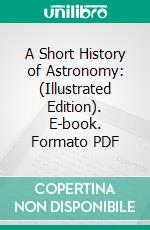Arthur Berry eBooks
eBooks di Arthur Berry di Formato Pdf
Short History of Astronomy. E-book. Formato PDF Arthur Berry - Forgotten Books, 2017 -
This Series is primarily designed to aid the University Extension Movement throughout Great Britain and America, and to supply the need, so -widely felt by students, of Text-books for study and reference, in connection with the authorised Courses of Lectures.Volumes dealing with separate departments of Literature, Science, Art, and History have been assigned to representative literary men, to University Professors, or to Extension Lecturers connected with Oxford, Cambridge, London, or the Universities of Scotland and Ireland.The Manuals are not intended for purposes of Elementary Education, but for students who have made some advance in the subject dealt with The statement of details is meant to illustrate the working of general laws, and the development of principles, while, the historical evolution of the subject dealt with is kept in view, along with its philosophical significance.The remarkable success which has attended University Extension in Britain has been partly due to the combination of scientific treatment with popularity, and to the union of simplicity with thoroughness. This movement, however, can only teach those resident in the larger centres of population, while all over the country there arc thoughtful persons who desire the same kind of teaching. Its aim is to supply the general reader with the same kind of teaching as is given in the Lectures, and to reflect the spirit which has characterised the movement, viz the combination of principles with facts, and of methods with results.
A Short History of Astronomy: (Illustrated Edition). E-book. Formato PDF Arthur Berry - Ionlineshopping.Com, 2019 -
Berry has written a truly excellent one-volume history of astronomy, and it was apparently a standard text for nearly fifty years after it first appeared in 1898. Berry is a good writer, neither too serious nor too frivolous, and with a pleasantly dry sense of humour; he evidently knows his subject very well. His presentation is impressively balanced: he devotes appropriate amounts of space to all periods of astronomical history up to his time (the Greeks, the Arabs, the Renaissance, the Newtonian period, the 19th century), and he favours neither observational nor theoretical aspects of astronomy but gives equal weight to both. He gives an excellent semi-technical summary of Ptolemaic astronomy and describes how it was further improved by the Arabs, and then by Copernicus; the continuity with Copernicus's work is particularly well done. He then explains how Kepler, thanks to Tycho Brahe's painstaking observations, was finally able to create something that was essentially different from Ptolemy's system; in general, one of the most appealing aspects of the book is the way in which it highlights the interplay between theory and practice. His chapter on Herschel was interesting. He also has a good chapter on the eighteenth century gravitational theorists - Clairaut, D'Alembert, Lagrange and Laplace - who achieved the remarkable feat of taking over Newton's work and converting a piece of English science into something that for over a century was quintessentially French. Berry's thought-provoking explanation is that the English mathematicians tried to follow the lines of the Principia too closely, and imitate Newton's geometrical style of proof; but this was something that only a genius of Newton's calibre could handle, and they got nowhere. The French, more pragmatically, developed the calculus, which turned out to be a far better direction in which to explore. He supports Lord Kelvin's theory that the Sun's energy comes from gravitational contraction, ignoring the fact that this gives an age for the Solar System that is at least an order of magnitude less than the age of the Earth, as determined from geological records. Although he mentions Michelson's accurate determination of the speed of light, there is not a word about the Michelson-Morley experiment (1887), which was just about to result in the Special Theory of Relativity. But the most striking passage of all was this one, concerning Bradley's explanation of the phenomenon of the aberration of light in terms of Newton's "corpuscular theory". Seven years later, Einstein would launch his idea of the "light-quantum", which would soon become the photon; and thus the corpuscular theory would live again. But Berry, evidently a very intelligent and knowledgeable person, has no inkling of this. One cannot help wondering: what vital clues are lying right under our noses, patiently waiting for us to discover them? Overall, an excellent book on astronomy for subject lovers.

